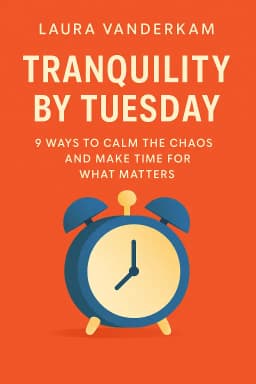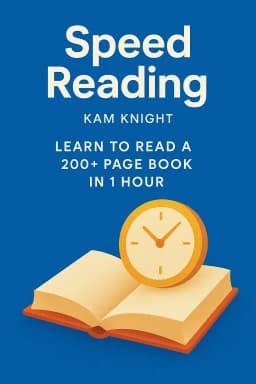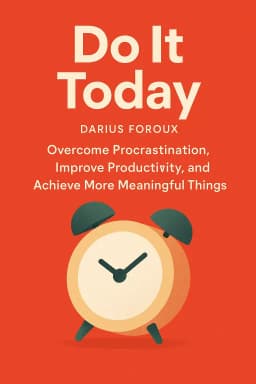
The Productivity Lie
Golden Hook & Introduction
SECTION
Mark: A quick analysis of the time-management section in any bookstore reveals a startling fact: 93 percent of the books are written by men. This isn't just a statistic; it's the hidden reason your planner probably isn't working for you. Michelle: Whoa, hold on. Ninety-three percent? That is a staggering number. Honestly, that explains a lot. I feel like I've spent a small fortune on planners over the years, each one promising to be the one, and every time I fail to stick with it, I just assume the problem is me. Mark: And that's the exact feeling our book today is here to dismantle. We're diving into The PLAN: How to Plan Your Life Like a Person, Not a Robot by Kendra Adachi. Michelle: Oh, I love her. Adachi is known as the 'Lazy Genius,' and she has this massive following because she approaches productivity with what's been called a 'Kind Big Sister' energy. It’s so different from the usual drill-sergeant vibe of this genre. Mark: It is. And she argues that the reason so many people, especially women, feel like they're failing at productivity is because the entire system is, in her words, rigged. Michelle: Rigged? That's a strong word. What does she mean by that? It sounds like a pretty bold claim.
The Rigged Game: Why Traditional Productivity Fails Women
SECTION
Mark: It's a bold claim, but she backs it up. Adachi argues there's a 'productivity-industrial complex' that thrives on our dissatisfaction. Think about it like the wedding industry. Contentment doesn't stimulate economic activity. If you were perfectly happy with your schedule, you wouldn't buy another planner, another app, another course. The system needs you to feel like you're not doing enough. Michelle: That is so true. There’s always a new method, a new hack. And the underlying message is always, 'You could be better, you could be more efficient.' It’s exhausting. Mark: Exactly. And she points out that this system was overwhelmingly built by men, for men. Their advice often ignores the fundamental realities of many women's lives. For instance, she brings up the biological difference in hormonal cycles. Men typically operate on a 24-hour hormonal cycle, which means their energy is relatively consistent day-to-day. Michelle: Right, which is why advice like 'wake up at 5 a.m. every single day and crush it' might work for them. Mark: Precisely. But many women operate on an approximately 28-day cycle. Their energy, mood, and focus can fluctuate dramatically from week to week. Yet, we're told to follow a system that assumes we are the same person with the same capacity every single day. When we can't maintain that, we blame ourselves. Michelle: Oh, I know that feeling. There are weeks where I feel like I can conquer the world, and other weeks where just getting through my inbox feels like climbing Everest. I always thought that was a personal failing, a lack of consistency. Mark: Adachi says it's not. It's biology. And this dismissal of women's physical reality has a long, dark history. She briefly touches on how, for centuries, any female emotional or physical complaint was written off as 'hysteria,' a word that literally comes from the Greek for uterus. They thought the uterus was just wandering around the body causing trouble. Michelle: You're kidding. A wandering uterus? That's both horrifying and, frankly, a little hilarious. But it makes the point. Our experiences have been systematically ignored or misunderstood. Mark: And that's her core argument. In the book, she says, "The problem isn’t you. It’s not your lack of dedication, consistency, or motivation... It’s because the current productivity paradigm doesn’t work for women. It’s that simple." Michelle: Okay, but I have to ask the skeptical question here. Isn't there a danger this just becomes a convenient excuse? You know, 'Oh, I didn't get it done, it's the patriarchy's fault, not my own lack of discipline.' Mark: That's a fair question, and she addresses it. It's not about abdicating responsibility. It's about working with your reality instead of constantly fighting against it. It's about choosing a different game to play, one that's designed for you. She's not saying don't be disciplined; she's saying apply your discipline to a system that actually fits your life. Michelle: A system that fits your life. Okay, I'm sold. The current game is broken. So what's her alternative? Please don't say it's another color-coded planner with a million stickers.
A New Lens for Living: The Philosophy of P.L.A.N.
SECTION
Mark: Definitely not. Her solution is less of a rigid system and more of a new lens for seeing your life. It starts with two foundational beliefs that change everything. The first is: the goal is not greatness, it's integration. Michelle: Integration, not greatness. I like that. It feels like permission to aim for a happy, functional B+ life instead of a miserable, exhausting A+ life that you see all over social media. Mark: That's a perfect way to put it. It's about being a whole person, not an optimized machine. The second belief is: start where you are, not where you want to be. So much productivity advice is about five-year plans and massive goals. Adachi says to first look at what's right in front of you. What does this season of your life require? Michelle: That feels so much more manageable. The five-year-plan stuff just makes me want to take a nap. Mark: And this leads to her central framework, which she calls The PLAN. It's an acronym for Prepare, Live, Adjust, and Notice. But before anyone gets nervous about another acronym, she presents it with a beautiful analogy. She says that managing your life is not like assembling a puzzle. Michelle: What does she mean by that? Mark: A puzzle has a picture on the box. There's only one right way to put the pieces together to get to a fixed, perfect outcome. If a piece doesn't fit, it's the wrong piece. That’s how most productivity systems treat our lives. Michelle: And life is definitely not a puzzle. My pieces are all from different boxes, and some are on fire. Mark: Exactly. Adachi says life is more like painting. You have a canvas—your life. You have your paints—your personality, your energy, your circumstances. And you have four main brushes: Prepare, Live, Adjust, and Notice. You use these tools to create a life that is uniquely yours. It’s a fluid, creative, and ongoing process. There's no single right way to do it. Michelle: I love that analogy. It's so much more forgiving. It implies that you can change colors, paint over things, and that the final picture is supposed to be your own creation, not a copy of the one on the box. Mark: Precisely. 'Prepare' is about thinking ahead, but only for what matters. 'Live' is about being present in your season. 'Adjust' is about the crucial skill of pivoting when things go wrong. And 'Notice' is about paying kind attention to what's working and what isn't, without judgment. Michelle: Now, I have to bring this up. The book has been a huge bestseller, but some reader reviews mention that with all the frameworks—The PLAN, the TODAY framework, the Lighten the Load list—it can feel a bit overwhelming. Is there a danger of this becoming just another complex system to fail at? Mark: It’s a valid critique, and I think it depends on how you approach it. If you try to implement everything at once, you're treating it like another puzzle. But Adachi's intent seems to be that these are different sets of brushes for different kinds of painting. You don't use every brush for every stroke. Michelle: So you pick the tool that fits the moment. Mark: Yes. And it's the mindsets behind them that matter most. For example, the mindset for 'Adjust' is "Now isn't forever." The mindset for 'Notice' is "Your body is wise." These aren't rules; they are gentle reminders. The core idea is to use the framework as a flexible lens, not a rigid cage.
Synthesis & Takeaways
SECTION
Michelle: That makes sense. So the real takeaway here isn't a new to-do list method. It's permission. Permission to be human, to have fluctuating energy, to have a messy canvas, and to not be a productivity robot. Mark: Exactly. And it's a radical re-centering of the entire purpose of time management. The goal of traditional productivity is to get more done, to be more efficient. Adachi argues the goal should be to live a life that matters to you. It shifts the entire focus from efficiency to meaning. Michelle: And that feels so much more sustainable. You can't be maximally efficient forever. Mark: You can't. When you manage your life for maximum efficiency, you eventually burn out. But when you manage your life for meaning, you build something that can last, something that feels whole. Michelle: So for anyone listening who feels overwhelmed by their planner and their to-do list, the first step isn't to buy a new planner. Mark: No. The first step, according to The PLAN, is just to Notice. For the next day or two, just notice your energy. Notice what feels easy and what feels hard. Notice when you feel joy. Do it all without judgment, just as an observer of your own life. That's the starting point. Michelle: I love that. Just notice. It feels so simple and yet so profound. We'd love to hear what you notice this week. Find us on our socials and share one thing you've noticed about your own rhythm or energy. It's a fascinating conversation to have with yourself and with others. Mark: This is Aibrary, signing off.









